Archive Record
Images
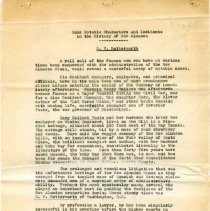
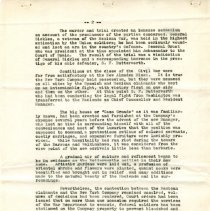
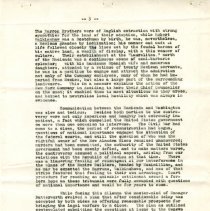
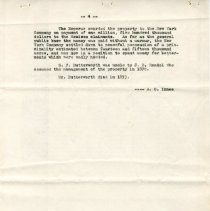
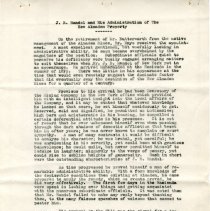
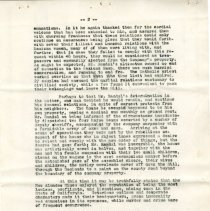
Additional Images [6]
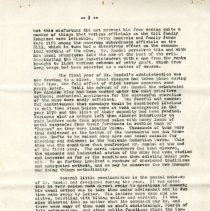
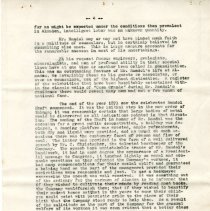
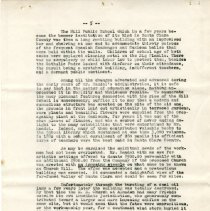
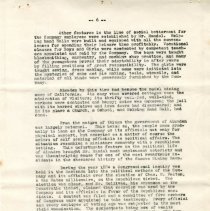
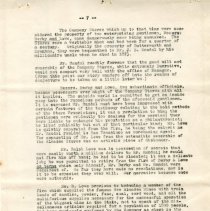
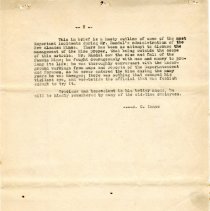
Metadata
Catalog number |
2015.8.435 |
Object Name |
Manuscript |
Description |
(IMPORTANT NOTE: The following manuscript contains factually incorrect material). TITLE: "Some Notable Characters and Incidents in the History of New Almaden" (Pages 1 through 4) and "J. B. Randol and the Administration of the New Almaden Property" (Pages 1 through 8). AUTHOR: A. C. Innes ---------------------------------------- Some Notable Characters and Incidents in the History of New Almaden ---- S. F. Butterworth A roll call of the famous men who have at various times been connected with the administration of the New Almaden Mines, would reveal a wonderful array of notable names. Its resident managers, engineers, and principal officials, have in the main been men of much prominence either before entering the employ of the Company or immediately afterward. Captain Henry Halleck who afterward became famous as a Major General during the Civil War, was for a time Resident Manager, his daughter Mary, the clever author of the "Led Horse Claim," and other books dealing with mining life, married the youngest son of Governor Foot, the war governor of Mississippi. Mary Halleck Foote and her husband who later was employed as Mining Engineer, lived on the Hill in a vine-clad cottage, situated about 300 feet west of the Day Tunnel. The cottage still stands, hid by a mass of rank shrubbery and weeds. Here amid the rugged scenery of the New Almaden hills, with an inspiring view of the fair valley of Santa Clara, the brilliant essayist and author, with her husband and baby boy for companions, contributed liberally to the literature of the time. More than forty five years have since passed, the baby boy that then was, is now, and has been for years the Manager of the North Star Consolidated Mining properties of Grass Valley, Nevada County. The prolonged and vexatious litigation that was the unfortunate heritage of the New Almaden Mines as they emerged from the tangled maze of Spanish and Mexican claimability. Perhaps the most spectacular among several who played an important part in guiding the destinies of the New Almaden properties during these stormy times was S. F. Butterworth of Washington, D.C. By profession a lawyer, he had been singularly successful in his practice before the higher courts in Washington, which at the time contained many men of eminent ability. The particular case that brought him into national prominence was in the defense of General Daniel Sickles for the murder of Phillip Brooks for an alleged liaison with the wife of General Sickles. "The Unwritten Law: which now is quite familiar, had not then attained its present sanction. The murder and trial created an immense sensation on account of the prominence of the parties concerned. General Sickles, a veteran of the Mexican War, was held in the highest extimation [sic] by the Union soldiers; he had been seriously wounded and lost an arm in the country's defense. General Grant who was president at the time appointed him Ambassador to the Court of Spain. The result of the trial was a vindication of General Sickles and a corresponding increase in the prestige of his able defender, S. F. Butterworth. Conditions at the close of the Civil War were far from satisfactory at the New Almaden Mines. It is true the New York Company held possession, but they were menaced on all sides by the Spanish and Mexican claimants who kept up an intenable fight, with victory first on one side and then on the other. At this point S. F. Butterworth who had been conducting the legal fight from Washington was transferred to the Hacienda as Chief Counselor and Resident Manager. The big house or "Casa Grande" as it was familiarly known, had been erected and furnished at the Company's expense several years before the advent of the new Manager, who lost no time in surrounding himself with all of the conveniences and most of the luxuries that the position was supposed to command, a pretentious retinue of colored servants, costly carriages, and expensive furniture were lavishly provided. While hospitality had run riot during the tenure of the Barons and Walking, it was considered from the view point of the new arrivals little less than barbaric. A gradual air of culture and refinement began to be in evidence as the Butterworths settled in their new home. Artistic gardens were laid out, a profusion of oriental shrubs and flowers were planted, quaint nooks were beautified and brought out in relief and many additions made to the natural beauty of the Hacienda and its surroundings. Nevertheless, the contention between the Mexican claimants and the New York Company remained unsolved, volumes of decisions had been rendered, Court orders had been issued that on more than one occasion required the services of the War Department to execute, federal soldiers has been stationed on the Company property to prevent bloodshed and carry out the mandates of the United States Supreme Court, and as if to keep the smoldering fires of contention burning and add to the danger of the situation, the Company employees took sides, some on one and some on the other. For an intelligent understanding of the situation at this time it is well to keep in mind that the former owners of the New Almaden Mines were citizens of Mexico. The Barron Brothers were of English extraction with strong sympathies for the land of their adoption, while Robert Walkinshaw was a Scotsman by birth, he was, nevertheless, a Mexican grandee by inclination; his manner and mode of life followed closely the lines set by the feudal barons of his native land, a wealth of display, with a thin veneer of culture. Their establishment at the "Laurelitos," north of the Hacienda was a continuous scene of semi-barbaric splendor; with his handsome Spanish wife and numerous daughters, attended by a retinue of twenty Mexican servants, he was in a position to engage and attract the admiration not only of the Company employees, many of whom he had imported from Mexico, but also a large part of the surrounding landowners. THis in a measure explains the action of the New York Company in deciding to have their Chief Counselor on the spot; it enabled them to meet situations as they arose, and helped to neutralize local hostility which was always in evidence. Communication between the Hacienda and Washington was slow and tedious. Besides both parties to the controversy were not only imperious and haughty but extremely impatient, a fact that compelled the United States government on more than one occasion to intervene. The Civil War had come to a close, the period of reconstruction had begun, questions of national importance engaged the attention of the federal courts, and still the question of who was the rightful owner of the New Almaden Mines remained unanswered; murders that been committed, the authority of the United States government had been openly defied, and to make matters worse the controversy assumed a political aspect, arising from our relations with the Republic of Mexico at that time. There was a lingering feeling of resentment at our interference in the plans of the Empire Builders, headed by Maximilian, and as may be expected the Barrons, Walkinshaws, and men of that stripe featured that feeling to heir own advantage. Court procedure for reaching an amicable settlement seemed a forlorn hope as these tribunals were fully occupied with questions of national importance and would be for years to come. While facing this dilemma the master-mind of Manager Butterworth evolved a plan that after considerable delay was accepted by both sides as offering reasonable prospects for bringing the legal warfare to a close. THe plan as outlined contemplated submitting the questions at issue to the Geneva Tribunal, the American members of which had just been appointed by President Grant for the arbitration of the Alabama Claims. Later it was found inadvisable to submit questions unrelated to he Alabama Claims, as there might be a possibility of nullifying the decision of the Tribunal by such introduction. After considerable delay, it was finally arranged by the State Department at Washington to submit the questions agreed upon to Emperor William of Germany, grandfather of the present Kaiser, his decision to be final. The Emperor awarded the property to the New York Company on payment of one million, five hundred thousand dollars to the Mexican claimants. As far as the general public knew the money was paid without a murmur, the New York Company settled down to peaceful possession of a principality estimated between fourteen and fifteen thousand acres, and was now in a position to spend money for betterments which were sadly needed. S. F. Butterworth was uncle to J. B. Randol who assumed the management of the property in 1870. Mr. Butterworth died in 1873." ---- A. C. Innes -------------------- -------------------- J. B. Randol and the Administration of the New Almaden Property On the retirement of Mr. Butterworth from the active management of the Almaden Mines, Dr. Mayo received the appointment. A most excellent gentleman, but woefully lacking in administrative ability, he soon became overwhelmed by the magnitude of the position. Subordinate officials quick to perceive his deficiency were busily engaged arranging matters to suit themselves when Mr. J. B. Randol of New York put in an appearance. He arrived unheralded at the Hacienda in the time that would even remotely suggest the dominant factor that did eventually sway the destinies of the New Almaden Mines for a quarter of a century. Previous to his arrival he had been Secretary of the Mining Company in the New York office which provided him with an intelligent insight into the local affairs of the Company, and it may be stated that whatever knowledge he lacked on that score, he set himself assiduously to get. Reserved, cold and dignified, he permitted no intimacies; high born and aristocratic in his bearing, he compelled a certain deferential attitude in his presence. It is not of record that he ever unbosomed [sic] himself even when passing through the dark shadows of domestic affliction that beset him in after years; he was never known to complain or court sympathy. A man of many contrasts it would be difficult to analyze his character; he was brutal, yet merciful; he was unrelenting in his severity, yet could beam with gracious benevolence; he could smile, but never permitted himself to indulge in laughter; niggardly to the verge of penury, yet could rise to sublime heights of generosity. Such in short were the outstanding characteristics of J. B. Randol. As time progressed, he proved himself a man of remarkable administrative ability. With a fore knowledge of the deplorable conditions then existing at Almaden, he came prepared to apply the remedy, which as events proved, he did very effectively. The first few days in the Hacienda were spent in looking over things and getting acquainted with the numerous subordinate officials. It was noted then that Mr. Randol failed to make any reply beyond thanking them, to the many fulsome speeches of welcome that seemed to pester him. His arrival on the Hill was the signal for a deputation of miners to extend a genuine western mining camp welcome. He listened attentively until the spokesman finished, then he thanked them, and stated that in the course of a day or two he would give them a more extended reply. In due time the reply came, in fact three of them in the form of bulletins posted on the Hill Office, the Store and Boarding House respectively. Consternation was depicted on the faces of the eager crowd as they gradually assimilated the contents of Mr. Randol's reply to their breezy welcome. It was a masterly document like all of Mr. Randol's pen emanations. In it he again thanked them for the cordial welcome that had been extended to him, and assured them with charming frankness that these relations could only continue on assurances being given that they would forthwith sever the illicit and immoral relations with the Mexican women, many of them were living with, and further, that in case they failed to comply with this request within 48 hours, they would be considered as trespassers and summarily ejected from the Company's property. As might be expected, Mr. Randol's ultimatum caused no end of commotion in the Mexican Camp, there was much hurried conversation, and running to and fro. The Catholic priest worked overtime so that when the time limit had expired, 27 couples had assumed the marital relations customary to civilized society, while a few found it convenient to pack their belongings and leave the Hill. Perhaps to test Mr. Randol's determination in the matter, one man decided he would remain, and continue his immoral relations, in spite of earnest protests from his neighbors. The house he occupied happened to be his own property, paying a nominal sum monthly as ground rent. Mr. Randol on being informed of the circumstance immediately dispatched two four horse teams escorted by a number of deputy sheriffs, accompanied by the company carpenter with a formidable array of axes and saws. Arriving at the scene of operations they were met by the rebellious occupant of the house who in abject tones expressed a desire to relent and comply with the new order of things, but the decree had gone forth; Mr. Randol was inexorable, the house was artistically sawed in halves, and together with the man and his female companion with their two small children, placed on the wagons in the most ceremonious manner before the astonished gaze of the assembled miners, their wives and children, the motley cavalcade moved off down the Hill, through the Hacienda to a point on the county road beyond the boundary of the company property. At this time it may be truthfully stated that the New Almaden Mines enjoyed the reputation of being the most lawless, profligate, and licentious, mining camp in the State of California. Notorious outlaws and desperate characters made it their headquarters, gross immorality was shameless in its openness, while murder and crime were of frequent occurrence. The immediate effect of Mr. Randol's lesson was salutary; it cleared the moral atmosphere and enabled the people to get a correct view of the decencies of life. Gamblers, prostitutes, and all the ignoble fraternity that fed and fattened on the earnings of the Company employees were summarily ejected, no leisure class was permitted, much less the class they represented. While these things were being accomplished under the economic and industrial affairs of the Company came under the eagle eye of Mr. Randol (actually and literally the gentleman had but one good working optic) the left one being obscured by a drooping eyelid, but this misfortune did not prevent him from seeing quite a number of things that various officials on the Hill fondly imagined were invisible. Petty quarrels and family feuds were rife among the numerous subordinate officials on the Hill, which in turn had a disastrous effect on the economical working of the mine. Mr. Randol perceived this and with his usual promptness laid the axe at the root of the evil. Supplanting the Mine Superintendent with a man from the ranks brought to light various schemes of petty graft, which from long usage had been accepted as a matter of course. The first year of Mr. Randol's administration was now drawing to a close. Great changes had taken place during that time, the full effect of which became apparent some years later. Until the advent of Mr. Randol, the celebrated New Almaden Mine had been worked under the most primitive methods; mechanical appliances for the successful operation of the mine were sadly deficient. Two fearful and wonderful contrivances that nowadays would be considered libelous to call them steam hoists were at work underground in the year 1870 and the limit of their capacity had been reached. Mexicans clad as nature left them climbed laboriously on rude ladders made from notched poles with heavy loads of metal suspended from their foreheads in rawhide bags or "Zurons" as they were locally known. Thousands of tons were thus delivered at the bottom of the Sacramento and San Francisco Shafts to be raised once more and taken outside for cleaning and shipment to the Hacienda Reduction Works. This then was the condition that confronted Mr. Randol at the end of the first year. The moral atmosphere had been cleared, the economic and industrial status of the mine had been studied and improved as far as the conditions then existing would permit. To go further involved a rupture of cherished traditions and antiquated methods, and as may be observed the New Manager was doing things methodically. Several little peculiarities in the mental make-up of Mr. Randol had developed during the year. It was noted that he very seldom made direct reply to questions of moment; his usual method was to take them under advisement and in due time make reply by letter. His letters were keen and incisive, bristling with biting satire and sarcasm. It was also observed that no matter what the occasion may be, and there were many of them such as shaft christenings, Fourth of July celebrations, and other public functions where the Company employees were grouped, Mr. Randol at no time or under any circumstances addressed them in public; he invariably hired an orator. To enumerate the many changes that had already taken place would be tedious, most of them had come about through the direct action of Mr. Randol while others followed as a natural sequence. Preparations were being made to operate the mine on a larger and more modern system. Crude methods that had been in vogue since the days of the Mission Padres were about to be discarded, the efficiency of the Company employees had to be raised to meet the requirements, for as might be expected under the conditions then prevalent in Almaden, intelligent labor was an unknown quantity. Mr. Randol may or may not have placed much faith in a multitude of counselors, but he certainly believed in consulting wise ones. This in large measure accounts for the remarkable success in most of his undertakings. At his request famous engineers, geologists, mineralogists, and men of profound ability in their special lines have at one time or another been called in consultation. This was an outstanding feature of Mr. Randol's life at Almaden. He invariably chose as his guests or associates, or even as consuelos, men of the highest distinction. A register of the celebrities that have been hospitably entertained within the classic walls of "Casa Grande" during Mr. Randol's residence there would reveal many men and not a few women of national fame. The end of the year 1871 saw the celebrated Randol Shaft commenced. It was the initial step in the new order of things; it was reasonably certain that large bodies of metal would be discovered as all indications pointed in that direction. The naming of the Shaft in honor of Mr. Randol was the occasion for a great public demonstration, a holiday was declared, a dancing platform was erected, ample refreshments, both dry and liquid were provided, and as usual on such occasions there was the customary feast of reason and flow of soul. The latter was provided in the form of a well delivered speech by Mr. Z. Christopher, the talented bookkeeper of the Company. The speech bore unmistakable traces of Mr. Randol's handiwork, it had in some degree the appearance of a Presidential message to Congress, it touched lightly on moral and economic questions as they affected the Company's workmen, it had many recommendations for their social uplift and guaranteed a helping hand on the part of the management provided their aspirations were reasonable and just. To use a hackneyed expression the speech was well received. It was something out of the ordinary for the workmen of Almaden to be informed that if they wished to cultivate their minds by reading good books, the Company would furnish them; that if they wished to beautify their modest homes so that in the years to come their children could point with patriotic pride to the place of their birth that the Company stood ready to help them. As a result of the solitude on the part of the Company for the general welfare of its workmen it was soon evident that a better class of workmen began to make their appearance. It was during the early 70s that quite a number of skilled miners settled in Almaden and remained for a lifetime happy and contented, while not a few raised and educated their children, that enabled them in after years to fill positions of trust and responsibility in the outside world. The Hill Public School which in a few years became the banner institution of its kind in Santa Clara County was then a long rambling building with an improvised bar and shelving at one end to accommodate thirsty patrons of the frequent Spanish fandangos and Mexican bailes that were held within its walls. Children of school age of both sexes were employed cleaning metal on the Big Planilla. There was no compulsory or child labor law to protect them, besides the Catholic Padre looked with disfavor on their attendance, the result being a wretched building, indifferent teachers, and a dormant public sentiment. Among all the changes advocated and advanced during the early years of Mr. Randol's administration, it is safe to say that in the matter of education alone, nothing approached it in rapidity and wholesome results. To enumerate the many pleasant features connected with the rise of the Hill School is unnecessary; suffice it to say that a modern and commodious structure was erected on the site of the old one, the grounds in front laid out artistically in terraced gardens, rare plants and beautiful flowers were supplied from the propagating plant at the Hacienda, for years it was one of the show places of Almaden, and was a source of never ending delight to the many notabilities that were entertained by Mr. Randol. Indeed, many of them contributed valuable books to the School library which contained at one time 3,000 volumes. In 1880 with a school enrollment of 260 pupils its efficient corps of teachers were the best paid in Santa Clara County. As may be surmised the spiritual needs of the workmen had not been overlooked. Mr. Randol with an eye for artistic settings offered to donate $500.00 personally with an additional $500.00 from the Company if the proposed Church was erected with an imposing steeple on what came to be known as Church Hill. The offer was accepted and a pretentious building was erected. It commanded a delightful view of the far-famed valley of Santa Clara and could be seen for miles. Unfortunately through the bursting of a coal oil lamp a few years later the building was totally destroyed. By that time the Methodist Episcopal Church at Almaden had many friends outside its own immediate jurisdiction, who generously contributed toward a larger and more imposing edifice on the same site, but it would seem that the fates were unpropitious, or the workmanship poor, for a southeast wind storm hurled it to the ground. Nothing daunted the present structure was erected mostly from the wreckage, and as a measure of safety it is partly built into the ground. Nevertheless, from its exposed position it has excited the fears of its devoted followers many times that it also would pursue the course of its predecessor. It still stands a monument to the persistence and courage of its builders. Other features in the line of social betterment for the Company employees were established by Mr. Randol. Helping Hand Halls were built and equipped with all the conveniences for spending their leisure time profitably. Vocational classes for Boys and Girls were conducted by competent teachers appointed and paid by the Company. The boys were taught blacksmithing, carpentry, and machine ship practice, and many of the youngsters proved their adaptability in after years by filling positions of great responsibility. The girls were taught sewing, dress making, while some were initiated into the mysteries of cake and pie making, tools, utensils, and material of all kinds were generously furnished by the Company. Almaden by this time had become the model mining camp of California. Its cozy vine covered cottages were the admiration of visitors; its thrifty well-fed, well-clad, workmen were contented and happy; crime was unknown; the jail with its barred windows and iron doors had disappeared; and in its place a Church, a School, and Helping Hand Hall, had come. From the nature of things the government of Almaden was largely paternal. This being so, the people came gradually to lean on the Company or its officials not only for physical support, but accepted as a matter of course the orders of self seeking officials in political affairs. The situation resembled a miniature monarchy with a republican setting. This unfortunate feature in the political life of Almaden brought Mr. Randol much unpleasant notoriety and was the underlying cause for one of the most remarkable incidents in the checkered history of the famous Mining Camp. During this year 1884 a Congressional inquiry was held in the Hacienda into the political methods of the Company and its officials over the election of Charles N. Felton, a San Mateo millionaire, on the Republican ticket. The election was close, and Mr. Sullivan, his opponent on the Democratic ticket, claimed that coercion was used by the Company and its officials in favor of the Republican candidate. A contest was filed and a committee of five members of Congress were appointed to take testimony. Every official and every employee of voting age was subjected to the most rigid examination. The contestants being men of wealth were represented by a brilliant array of counsel. The Company also had the best legal talent obtainable. The investigation took a wide range, and while it brought into relief many of the wholesome features that Almaden was then enjoying, it also unearthed a wealth of other things that the general public were blissfully ignorant of. The Company Stores which up to that time were considered the property of two enterprising gentlemen, Messrs. Derby and Lowe, came dangerously near being unmasked. The Stores were a veritable mint and had been for a quarter of a century. Originally the property of Butterworth and Brenham, they were bequeathed to Mr. J. B. Randol by his millionaire uncle when he died in 1873. Mr. Randol readily foresaw that the good will and ownership of the Company Stores, while extremely lucrative, would not comport very well with the office of Manager. (From this point our story wanders off into the realms of conjecture to be taken up a little later on.) Messrs. Derby and Lowe, two subordinate officials, became possessors over night of the Company Stores with all it implies. The outside world is permitted to get an inside peep into the rapacious methods of the aforesaid gentlemen. It is supposed Mr. Randol must have been impressed with certain features of the testimony relating to the bold methods of the Store Proprietors; it was a revelation to him; the gentlemen were evidently too zealous for the service; they were liable to endanger his reputation as a philanthropist; he liked publicity but not of that particular kind; Mr. Lowe is quietly separated from the firm, he being the culprit as Mr. Randol resided in San Francisco as a purchasing agent. The separation of Mr. Lowe from the ostensible ownership of the Almaden Stores was an artistic piece of diplomacy. Mr. Ralph Lowe was in possession of secrets that were easily worth a million dollars to Mr. Randol; he could not fire him off hand; He had to be placated; it was a delicate job; he was permitted to retire from the firm of Derby & Lowe on terms which only himself, Mr. Derby and Mr. Randol were cognizant of. So far they have made no revelations, nor is it to be expected they ever will. Our narrative becomes once more authentic. Mr. R. Lowe previous to becoming a member of the firm which supplied the famous New Almaden Mines with train loads of candles, powder, fuse, coal, cord wood, and all the multifarious supplies necessary for the successful operation of the biggest mine in the State, not to speak of the miscellaneous articles required for a population of 1800 people, had been variously employed by the Company as clerk in the Hacienda Office, Justice of the Peace, and Planilla Boss, supervising the cleaning of the metal. All the despicable, oppressive methods practiced by the Stores and in full operation when the Congressional inquiry started were generally charged to Mr. Lowe, who was known to be thoroughly heartless. A sigh of relief went up from the community on his departure. Mr. Derby assumed full charge of the Stores. The restrictions were less severe. This in brief is a hasty outline of some of the most important incidents during Mr. Randol's administration of the New Almaden Mines. There has been no attempt to discuss the management of the Mine proper, that being outside the scope of this article. Mr. Randol saw the rise and fall of the famous Mine; he fought courageously with men and money to prolong its life; he was thoroughly conversant with the underground workings from maps and reports of the Superintendent and foreman, as he never entered the mine during the many years he was Manager; there was nothing that escaped his vigilant eye, and woe-betide the official that was foolish enough to try it. Gracious and benevolent in his better moods, he will be kindly remembered by many of the old-time employees. ---- A. C. Innes |
People |
Barron Edward Barron William Barron, R. Barron, William Eustace Butterworth, Samuel Fowler Christopher, Z. Derby, Charles C (C.C.) Emperor William of Germany Foote, Mary Hallock Halleck, Henry (Wager, Sr., Jr.) (Capt.) (General) Innes, Alex (A.C.) Lowe, Ralph Mayo, Dr. E.J. Mayo, J. R. (Dr.) Randol, James Butterworth Walkingshaw, Robert Walkinshaw, M. E. |
Cataloged by |
Wicks, Susan |
Credit line |
Donated by the Wright-Hauck family |
